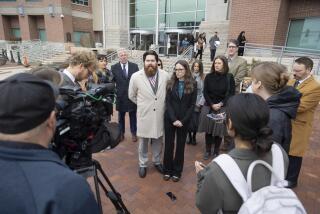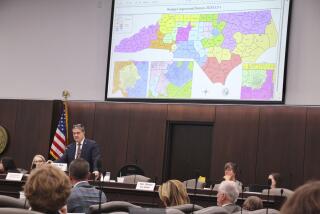North Carolina says it will no longer defend gay marriage ban in court
North Carolina’s attorney general said Monday that the state would stop defending its same-sex marriage ban against legal challenges, just hours after a federal appeals court ruled that a similar ban in Virginia is unconstitutional.
At a news conference Monday afternoon, Atty. Gen. Roy Cooper said he had made the decision because the appeals court ruling “predicts our law will be struck down.”
“Simply put, it is time to stop making arguments we will lose and instead move forward, knowing that the ultimate resolution will likely come from the U.S. Supreme Court,” Cooper said.
Voters in the state approved the ban, known as Amendment One, in 2012. The highly restrictive law defined marriage as the legal union of a man and woman, and also banned civil unions and domestic partnerships for gay and straight couples.
It passed with 61% of the vote.
Four pending cases challenge the ban, which is similar to Virginia’s, Cooper said. The proceedings in three of the four cases were stayed pending today’s 4th Circuit Court of Appeals decision, and there is a motion to stay in the fourth.
Legal experts say the next step for plaintiffs in North Carolina would be to reopen those proceedings in the state’s district courts.
“I think those plaintiffs will go forward and try to have the district judges rule in their favor, and invalidate that ban,” said Professor Carl Tobias, who teaches constitutional law at the University of Richmond. “Then at least that will be on the record.”
Without state attorneys to defend the law, and with today’s ruling from the federal court, overturning the ban could, in theory, be a simple sequence of events.
But, Tobias says, the fate of same-sex marriage bans in North Carolina, South Carolina, Virginia, and West Virginia depends more immediately on whether the federal court decision will be stayed so that higher courts can work out the legal issues.
Monday’s ruling did not automatically stay the decision. Tobias says it’s likely clerks in Virginia will seek, and be granted, a stay while they appeal the decision to the U.S. Supreme Court.
If the stay is not granted, however, Tobias says it could leave officials in those states in a “legal limbo” over whether or not they can issue marriage licenses in the meantime.
Ultimately, however, the Supreme Court will likely decide the issue, either by agreeing to take up one of several cases currently winding through the federal court system nationwide, or by declining to review the 4th Circuit Court of Appeals’ decision, effectively allowing it to stand.
Chris Brook, legal director for the ACLU of North Carolina, which is representing nine couples in two of the North Carolina cases, called Monday’s decision a victory, and said his clients planned to push forward with their cases on the district court level.
“State marriage bans, such as the one we have here in North Carolina, are living on borrowed time,” Brook said. “It’s a matter of when -- not if -- they are struck down.”
He said Cooper’s announcement only underscores the recent and continuing string of legal victories for same-sex marriage advocates.
“At a certain point, a good lawyer knows a losing cause when he sees one,” Brook said.
For more breaking news, follow me @cmaiduc
More to Read
Start your day right
Sign up for Essential California for news, features and recommendations from the L.A. Times and beyond in your inbox six days a week.
You may occasionally receive promotional content from the Los Angeles Times.







